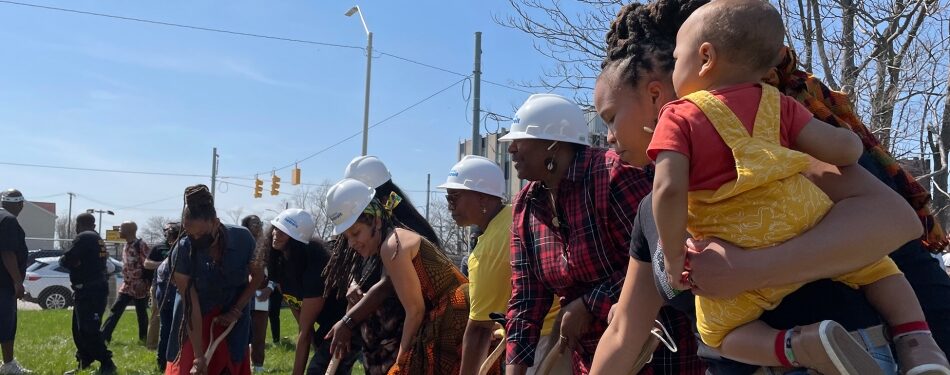Source: Michigan Law

Detroit Black Community Food Security Network board members and staff break ground on the Detroit Food Commons in April 2022.

Detroit Black Community Food Security Network board members and staff break ground on the Detroit Food Commons in April 2022.
Earlier this year, the Detroit Black Community Food Security Network broke ground on the Detroit Food Commons, a new complex in the city’s historic North End district that will house a co-op grocery store, an incubator kitchen for local food entrepreneurs, and other initiatives and community spaces that will address food insecurity in the city.
Under the supervision of clinical faculty, students in the University of Michigan Law’s Community Enterprise Clinic provide the network with free legal services related to land acquisition and other real estate transactions, development and financial contracts, nonprofit governance, and other matters. The network is the clinic’s longest-standing client, and the Detroit Food Commons is the latest project that the clinic has contributed to during their more than 14-year partnership.
The network’s mission is to increase community involvement in urban agricultural projects, improve food security for Detroiters, and influence food-related policy in the city of Detroit. The organization’s goals closely align with the clinic’s focus on assisting organizations that promote community economic development and address racial, economic, and social justice issues in disinvested urban areas in southeast Michigan.
According to Dana Thompson, ’99, clinical professor of law and director of the Community Enterprise Clinic, it’s rare for the clinic to work with a single client for so long. But the organization’s values, importance to Detroit, and wide range of legal needs has resulted in a long and mutually beneficial relationship.
“In order to have credibility when you’re doing work in a community, people have to trust you and trust that you’re committed to the community and to the work. The fact that we’ve been there for a long time gives us that credibility, and the students really admire and respect the organization,” Thompson said.
A multiyear partnership leads to improved food access for Detroit
Construction on the Detroit Food Commons is underway, and the complex is expected to open in 2023. In addition to a cafe, a licensed community kitchen for food entrepreneurs, and other community spaces, the Commons will host a cooperatively owned grocery store, the Detroit People’s Food Co-op, which aims to have 2,000 member-owners when it opens.
“Students and staff from the clinic have been instrumental in DBCFSN’s 12-year journey to open the Detroit People’s Food Co-op and the Detroit Food Commons,” said Detroit Black Community Food Security Network executive director Malik Yakini, who noted that students worked on bylaws, articles of incorporation, and reviewing land purchasing agreements for the co-op.
“Over the years, I have found CEC students to be well informed, courteous, professional, well organized, and timely. We would not have gotten to this point in the project without them,” he said.
Clinic students embrace holistic pedagogy and practical experience in Detroit
Dashaya Foreman, a U-M law student, assisted with acquisition agreements and real estate matters when she worked in the clinic last year.
“I was interested in a clinic that had ties to local nonprofits and community-based organizations in Detroit, and the Community Enterprise Clinic was a great way for me to learn how to work directly with clients and tackle complex legal issues,” Foreman said. “I am from Philadelphia, which is similar in some ways to Detroit, so it was an opportunity to give back to people who I feel I have a deep connection to.”
Ismail Buffins, a law student who studied sociology as an undergraduate and religion and ethics during a master’s program, was drawn to the clinic to explore the intersection of race, economics, and politics in Detroit—while also learning practical skills and working directly with clients and community organizations.
“The clinic provided a really holistic pedagogy, and we read about Detroit history while also learning about the law, which was important for us as students and also helped us better understand the goals and strategies of our clients,” Buffins said. “We learned about transactional work as it relates to small businesses, nonprofits, and startups. It was great to work in a sector of the economy that I care about and support the work that nonprofits can do for communities.”

